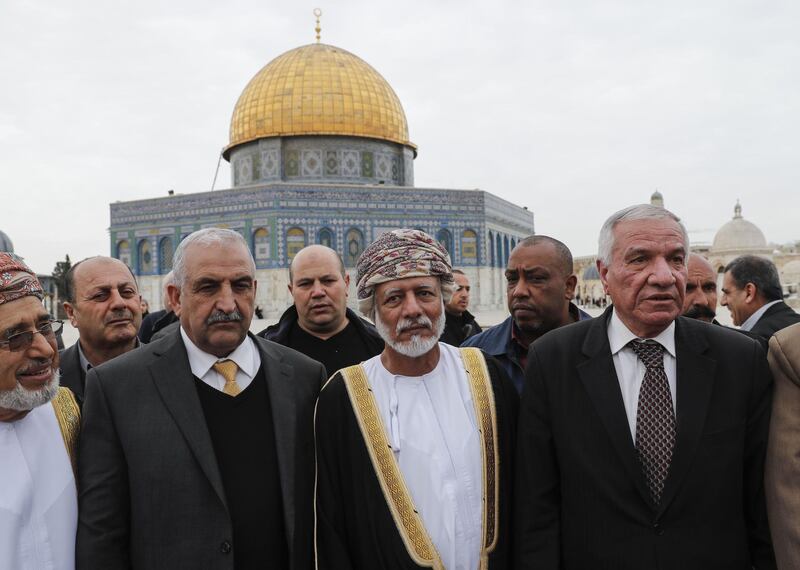Oman’s quiet diplomacy is back on display in Washington this week with the Gulf country's foreign minister set to discuss mediation efforts on two fronts: Israel-Palestine and Yemen.
Minister Yusuf bin Alawi touched down in the US capital in his second visit since July and is expected to meet with Secretary of State Mike Pompeo on Wednesday as wells as members of Congress.
Mr Alawi will also hold talks with President Donald Trump's advisor to Israel Jason Greenblatt, in a move that underscores Muscat's growing role in the Israel-Palestine peace process.
In the first meeting of its kind in more than 20 years Oman's Sultan Qaboos bin Said in October hosted Israeli Prime Minister Benjamin Netanyahu, sending shock-waves across the region.
_______________
Read more:
Nikki Haley says US peace plan will upset Israelis as well as Palestinians
Palestinian aid appeal for 2019 slashed to $350m
Trump threatens cuts to countries who voted against Hamas resolution
Trump chooses loyalty over experience in Heather Nauert as UN ambassador
______________
Following Mr Netanyahu's controversial visit, in a speech at the Manama dialogue, Foreign Minister Alawi said “Israel is a state present in the region, and we all understand this...maybe it is time for Israel to be treated the same and to also bear the same obligations.”
Palestinian President Mahmoud Abbas also visited Oman in October to explore jump-starting the peace talks, stalled since 2016.
Robert Danin, the former head of the Quartet Mission in Jerusalem, tweeted from Muscat on Tuesday: “Omani officials compellingly explain [that] their recent engagement with senior Israelis and Palestinians reflects a genuine desire to see a true peace and Israel integrated into the Middle East.”
Omani officials in Muscat compellingly explain their recent engagement with senior Israelis and Palestinians reflects a genuine desire to see a true peace and Israel integrated into the Middle East. pic.twitter.com/9QurOEt8o2
— Robert Danin (@robertdanin) December 18, 2018
Mr Danin, also a former senior US official and currently a senior fellow at the Council on Foreign Relations and the Harvard Belfer Center, told The National that Mr Alawi's visit to Washington is a follow-up of Oman's diplomatic outreach.
The sultanate, explained Mr Danin, is ensuring that its diplomacy vis-a-vis Israel-Palestine "is synchronised with the Trump administration thinking".
The White House is preparing to announce its long-awaited peace plan in the first quarter of 2019, with some experts questioning whether conditions are right.
Recent developments in Israel and Palestine have exacerbated an already strained situation, and this could delay the release of the White House document.
“Oman’s efforts further expand upon the regional dimension to supporting Israeli-Palestinian peace efforts...that said, no outside party can ameliorate the fundamental bilateral Israeli-Palestinian impasse,” Mr Danin said.
Oman’s peculiar diplomatic standing is not new. The small Gulf nation has historically played key mediating roles in times of crisis - including the Iran-Iraq war in the 80s, the first Gulf War in the early 90s and more recently in reaching a nuclear deal with Iran under the Obama administration.
Randa Slim, a senior Fellow and Director of Conflict Resolution and Track II Dialogues Program at the Middle East Institute, told The National that Oman is trying to make itself useful to the White House at a time when its GCC allies are involved in separate standoffs.
Particularly on Yemen, Oman plays both a role in border security and as a channel to the Houthi rebels, some of whose leaders live in Oman.
However, said Ms Slim, “there are different voices and power centres inside Oman working on Yemen which might not always benefit the UN effort.”
While the US is supporting UN envoy Martin Griffiths “by putting pressure on Gulf partners, they also have limits in how far they can go. It is not in US interest to have any deal perceived to be in Houthis’ favor,” said Ms Slim.
Stephen Seche, a former US ambassador to Yemen, said Oman could play a role in bringing the warring Yemeni parties together because of its proximity to the country and its productive working relationship with the Houthi leadership.
“On multiple occasions, Oman has hosted talks aimed at bringing the war to a close, and may serve as the host of the next round of talks scheduled for early next year,” Mr Seche said.






